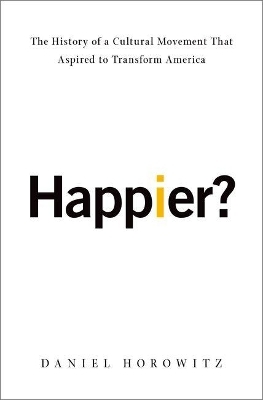
Happier?
Oxford University Press Inc (Verlag)
978-0-19-065564-8 (ISBN)
Happier? provides the first history of the origins, development, and impact of the way Americans -- and now many around the world -- shifted from mental illness to well-being as they pondered the human condition. This change, which came about from the fusing of knowledge drawn from Eastern spiritual traditions, behavioral economics, neuroscience, evolutionary biology, and cognitive psychology, has been led by scholars and academic entrepreneurs, as they wrestled with the implications of political events and forces such as neoliberalism and cultural conservatism, and a public eager for self-improvement.
Linking the development of happiness studies and positive psychology with a broad series of social changes, including the emergence of new media and technologies like TED talks, blogs, web sites, and neuroscience, as well as the role of evangelical ministers, Oprah Winfrey's enterprises, and funding from government agencies and private foundations, Horowitz highlights the transfer of specialized knowledge into popular arenas. Along the way he shows how marketing triumphed, transforming academic disciplines and spirituality into saleable products. Ultimately, Happier? illuminates how positive psychology, one of the most influential academic fields of the late twentieth and early twenty-first centuries, infused American culture with captivating promises for a happier society.
Daniel Horowitz is the Mary Huggins Gamble Foundation Chair and Professor of American Studies Emeritus at Smith College. He is a historian whose work focused on the history of consumer culture and social criticism in the U.S. during the 20th century. He has received fellowships from the National Endowment for the Humanities, and the John Simon Guggenheim Memorial Foundation. Among his publications are a biography of Betty Friedan and three books on how American and European writers, from the 1830s to the late twentieth century wrestled with the onsequences of affluence.
Introduction
Chapter 1: From Helplessness to Optimism: Martin Seligman and the Development of Positive Psychology
Chapter 2: Misery and Pleasure in the Origins of Happiness Studies, 1945-70
Chapter 3: Crisis of Confidence? 1970-83: Providing the Groundwork for the Study of Positive Happiness
Chapter 4: Morning in America, 1984-98: Assembling Key Elements in the Study of Happiness and
Positivity
Chapter 5: Drawing (and Crossing) the Line: Academic and Popular Renditions of Subjective Well-Being, 1984-98
Chapter 6: Building A Positively Happy World View
Chapter 7: The Future in Here: Positive Psychology Comes of Age
Chapter 8: The Business of Happiness
Coda: The Happiest Place on Earth
| Erscheinungsdatum | 29.01.2018 |
|---|---|
| Verlagsort | New York |
| Sprache | englisch |
| Maße | 236 x 160 mm |
| Gewicht | 558 g |
| Themenwelt | Geisteswissenschaften ► Psychologie ► Allgemeine Psychologie |
| Geisteswissenschaften ► Psychologie ► Humanistische Psychotherapien | |
| Geisteswissenschaften ► Psychologie ► Sozialpsychologie | |
| Geisteswissenschaften ► Psychologie ► Verhaltenstherapie | |
| Studium ► 1. Studienabschnitt (Vorklinik) ► Histologie / Embryologie | |
| Sozialwissenschaften ► Soziologie | |
| ISBN-10 | 0-19-065564-X / 019065564X |
| ISBN-13 | 978-0-19-065564-8 / 9780190655648 |
| Zustand | Neuware |
| Informationen gemäß Produktsicherheitsverordnung (GPSR) | |
| Haben Sie eine Frage zum Produkt? |
aus dem Bereich


